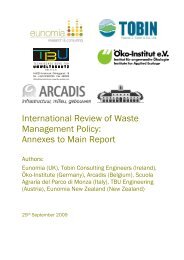Report of the Local Government Efficiency Review Group
Report of the Local Government Efficiency Review Group
Report of the Local Government Efficiency Review Group
You also want an ePaper? Increase the reach of your titles
YUMPU automatically turns print PDFs into web optimized ePapers that Google loves.
25. Financial performance indicators should be verified as part <strong>of</strong> <strong>the</strong> annual audit<br />
and reported on as part <strong>of</strong> <strong>the</strong> audit report, <strong>the</strong> annual financial statement,<br />
and <strong>the</strong> publication <strong>of</strong> service indicators (short-term – section 7.5.6);<br />
26. <strong>Local</strong> authority performance against national VFM studies, capital spot<br />
checks, efficiency reviews or VFM follow-up reports should be considered by<br />
<strong>the</strong> local government auditor. <strong>Local</strong> authority progress in relation to VFM /<br />
efficiency reviews should also be discussed with <strong>the</strong> audit committee (shortterm<br />
– sections 7.4.5 to 7.4.7);<br />
27. An improved website area should be created for <strong>the</strong> <strong>Local</strong> <strong>Government</strong> Audit<br />
Service, on which all audit publications, including <strong>the</strong> annual audit reports, as<br />
well as information on local VFM studies, efficiency reviews and best practice<br />
could be made available to <strong>the</strong> public (short-term – section 7.4.8);<br />
28. <strong>Local</strong> authority elected members should receive quarterly reports at a<br />
minimum on <strong>the</strong> financial performance <strong>of</strong> <strong>the</strong> council against <strong>the</strong> approved<br />
budget (short-term – section 7.5.4);<br />
29. All local authorities must meet <strong>the</strong> statutory deadline for preparation <strong>of</strong> <strong>the</strong><br />
draft annual financial statement (short-term – section 7.5.1 to 7.5.2);<br />
30. Cash flow statements should be prepared at regular intervals and considered<br />
by <strong>the</strong> local authority management team, with appropriate action taken (shortterm<br />
– section 7.5);<br />
31. The necessary remedial action should continue to be pursued intensively in<br />
respect <strong>of</strong> <strong>the</strong> significant revenue account deficits in a number <strong>of</strong> local<br />
authorities (short-term – section 7.6.4).<br />
Shared Services<br />
32. A uniform human resource and payroll system should be implemented for<br />
local authorities (short-term – section 8.4.3);<br />
33. All local government recruitment and promotion for clerical, administrative,<br />
and pr<strong>of</strong>essional staff should be conducted through <strong>the</strong> Public Appointments<br />
Service (short-term – section 8.4.12);<br />
34. The business case for a shared service approach between local authorities in<br />
<strong>the</strong> fields <strong>of</strong> fire services, homelessness, building inspection, internal audit,<br />
motor tax, and e-<strong>Government</strong> initiatives, ei<strong>the</strong>r on a regional basis or on a<br />
lead authority model should be evaluated, having regard to timescale, service<br />
improvements and anticipated cost savings, as well as <strong>the</strong> proposed joint<br />
administrative areas (short-term – section 8.5 and o<strong>the</strong>r sections throughout<br />
<strong>the</strong> report);<br />
35. Single, national ICT applications with common business rules for all local<br />
authorities should be pursued wherever possible, as opposed to multiple and<br />
duplicating local ICT applications (short-term – sections 8.4.4 to 8.4.11);<br />
36. ICT infrastructure services across <strong>the</strong> sector should be consolidated and<br />
delivered as a shared service by ‘lead authorities’ or <strong>the</strong> <strong>Local</strong> <strong>Government</strong><br />
Management Agency (short to medium-term – sections 8.4.4 to 8.4.11);<br />
37. The ICT systems used by local authorities and those bodies to which <strong>the</strong>y<br />
report should be compatible (medium-term – sections 8.7.8 to 8.7.10);<br />
38. The Regional Design Office model should be extended to o<strong>the</strong>r local authority<br />
service areas, for example to <strong>the</strong> procurement, land acquisition, project<br />
management through planning and construction, and asset management <strong>of</strong><br />
173
















